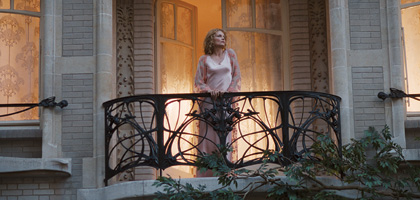
Chéri
UK/France/Germany/Cayman Islands 2009

Reviewed by Lisa Mullen
Synopsis
Our synopses give away the plot in full, including surprise twists.
Paris, 1906. High-class courtesan Léa de Lonval is reaching the end of her career. She has achieved wealth and independence but is rejected by polite society. Taking tea with Madame Peloux, a former rival courtesan (now retired and run to fat), she encounters Peloux's dissolute and immature 19-year-old son Fred, nicknamed Chéri. Peloux wants her to take him in hand. The attraction is instant, and develops into a six-year affair, with Léa mentoring Chéri in the ways of the world. The relationship ends abruptly when a marriage is arranged between Chéri and Edmée, the pretty young daughter of another former courtesan. Both Léa and Chéri pretend not to care, but miss each other horribly. Chéri mistreats and ignores his young bride; Léa leaves Paris to grieve in secret. When she hears that Chéri has left his wife, Léa returns, full of hope. He is equally desperate to see her, but after one passionate night she realises he is suddenly acutely aware of her age. Bravely, she accepts that he must leave her, and tells him to embrace his future.
A voiceover tells us that World War I is about to shatter everyone's lives - and that Chéri later realises Léa was the only woman he could ever love, and shoots himself.
Review
You have to feel sorry for the rest of the cast of Chéri: Michelle Pfeiffer has made this film her own. The role of Léa de Lonval, a high-class prostitute at the heart of Paris' turn-of-the-century demi-monde, demands that she be both irresistibly fascinating and desperately vulnerable - a delicate balancing act that in the wrong hands could have toppled into hysteria. But between them, Pfeiffer and director Stephen Frears have created a riveting portrait of a woman on the run from age and time. The film's intense two-handed structure may not have the narrative richness of their first collaboration, Dangerous Liaisons, but it easily stands comparison with that 21-year-old masterpiece.
The theme of beauty's decay is not new to celluloid, nor was it new to literature when Colette wrote the novella on which the film is based. This time, the crushing retreat of youth is played out via an affair with a much younger man, Fred (Rupert Friend), who is nicknamed Chéri but whose brittle hedonism and emotional froideur make him far from endearing, despite his studied charm. For the equally self-created Léa, though, he is the perfect foil, and becomes both her ideal lover and - inescapably - her surrogate child. When, six years later, his real mother - another former courtesan, Madame Peloux (Kathy Bates) - arranges a marriage for him, both Léa and Chéri are devastated, though both feel obliged to hide their feelings. The second half of the film deals with the consequences of their inability to admit that they are not, despite their protestations, immune to love.
Friend is excellent as Chéri, convincing both as obnoxious brat and as confused little boy, and capable of absorbing and matching every subtle flicker of Pfeiffer's remarkably nuanced performance. Bates, on the other hand, adopts a surprising level of theatrical bluster for her role as the cold-hearted mother from hell; perhaps her skin-deep persona was a deliberate ploy to enhance the three-dimensionality of the two main protagonists. For, apart from the sympathetic character of Edmée, Chéri's doomed bride (Felicity Jones), no one else in the courtesans' glossy fantasyland seems to have an interior life. The breathtaking lifestyle they have bought by selling sex - and cinematographer Darius Khondji evokes both the impressionists and the Pre-Raphaelites in every stunning, jewel-like shot - is peopled by hideous caricatures.
There is a subtext here that asserts itself more and more strongly as the film plays out: the parallel between Léa's predicament and that of modern-day Hollywood sirens whose careers sit on a similar ticking time-bomb. Both worlds are built on artifice, and offer great rewards to their darlings while turning pitilessly on those who slip from the top. Pfeiffer's astonishing looks have by no means deserted her, but Frears uses light devastatingly to expose her age at crucial moments. And her extreme thinness speaks both of Léa's determination not to let herself go in any sense, and of the ineluctable showbiz equation between visible bones and professional viability.
It may look pretty but this is a bitter, uncompromising film. Chéri, a young man at the top of his game, may walk away with his options intact; for Léa, the snuffing-out of possibility, even identity, is all too immediate. After all, like the second Mrs de Winter in Rebecca, even her story is named after someone else.
Credits
- Directed by
- Stephen Frears
- Produced by
- Bill Kenwright
- Producers
- András Hámori
- Tracey Seaward
- Thom Mount
- Written by
- Christopher Hampton
- Based on the novels Chéri (1920) and La Fin de Chéri (1926) by Colette
- Director of Photography
- Darius Khondji
- Film Editor
- Lucia Zucchetti
- Production Designer
- Alan MacDonald
- Music by/Music Conducted by
- Alexandre Desplat
